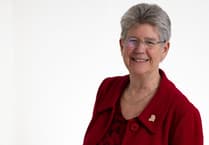POLICIES in Wales should be “rural-proofed” to tackle countryside poverty and deprivation which was “all too often hidden in plain sight”, a Carmarthenshire politician said.
Cllr Hefin Jones introduced a motion at a meeting of full council saying rural poverty differed to urban poverty and was often masked. “This is not always revealed by conventional indicators or ways of measuring poverty,” he said.
The Plaid Cymru councillor said there was a “rural premium” – such as higher costs, lower wages and poorer access to services – which compounded hardship. He cited a 2016 report by the Public Policy Institute which concluded that rural poverty was a significant UK issue which needed different solutions. It said: “This is particularly relevant in Wales, which has a relatively large rural area and high levels of poverty compared to the UK average.”
The amended motion called on the Welsh Government to establish a statutory duty to rural-proof all policies and strategies, ensure relevant adjustments in consideration of their impact on residents without having an adverse impact on people living in towns, and collaborate with experts to develop new targets and criteria to reduce rural poverty and deprivation.
Cllr Jones said Carmarthenshire was 60% rural, but added: “Let me be absolutely clear, this is not about pitting rural areas against urban areas.” He claimed there was plenty of academic evidence which said the Welsh Government was not able to tackle poverty in rural areas, which he felt was “deplorable”. Other devolved nations, he said, did consider the impact of policies on rural areas.
Cllr Carys Jones, who seconded the motion, said transport, keeping warm, and access to work and public services were basic needs and that heating oil costs for the many off-grid homes in the countryside had risen considerably. Taking away one of those needs, she said, was “disastrous”.
Another Plaid councillor, Bryan Davies, said there was one bus a week – at 9.30am on Tuesday – from his village north of Carmarthen to the county town each week. Some rural areas, he added, had poor broadband services.
Cllr Gareth Thomas, also Plaid, said 11 out of 12 farms in his Hendy ward had become small-holdings with only one traditional working farm left. He said that, according to his accountant, only five out of 200 farms were making a profit. Small farmers were being pushed out, he said, or didn’t want to admit their business wasn’t viable. “Third generation farmers are too proud to go cap in hand for help,” he said.
Labour councillors including Gary Jones also pitched in. He asked why Plaid Cymru hadn’t brought this issue forward when in coalition at Cardiff Bay with Welsh Labour, while Cllr Lewis Davies said problems with legislation in Northern Ireland called the Rural Needs Act had been identified, such as a lack of understanding or public authorities treating it as a “tick box exercise”.
Labour opposition leader, Cllr Deryk Cundy, said he believed the Welsh Government was looking at policies to help rural areas, while Cllr Martyn Palfreman said this area was surely something surely the council could work on. Independent unaffiliated councillor Steve Williams described himself as a “townie” who felt rural areas “have been left behind”.
Cllr Hefin Jones said work was being done by the council with limited resources to tackle rural poverty, and that Plaid had brought this matter to attention when it had been in coalition with Welsh Labour. The motion was passed unanimously.
The Welsh Government said it didn’t intend to develop a rural strategy but that it was committed to delivering support across all parts of Wales through policy interventions and funding mechanisms. Its new transport strategy, it said, aimed to develop public transport models tailored to the needs of rural communities. It added that new policies were subject to a “rural proofing assessment” as part of so-called integrated impact assessments.
“Our commitment to eradicating poverty is an absolute priority and support should be available to everyone in all parts of Wales,” said a Welsh Government spokeswoman.
“We do, however, recognise that the lived experience of poverty can be different for many in rural areas and that the increased cost of living has hit rural families particularly hard.”
People needing support can contact Advicelink Cymru’s ‘Claim What’s Yours’ helpline on 0808 2505700.

.jpeg?width=209&height=140&crop=209:145,smart&quality=75)



Comments
This article has no comments yet. Be the first to leave a comment.